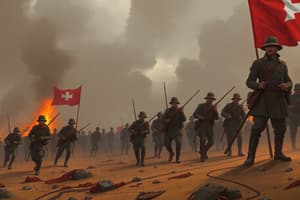Podcast
Questions and Answers
What was the primary purpose of the Treaty of Versailles?
What was the primary purpose of the Treaty of Versailles?
- To lead to the rise of extremism
- To impose heavy penalties and territorial losses on Germany (correct)
- To establish the Soviet Union
- To introduce the New Deal
Which of the following leaders was NOT present at the Paris Peace Conference?
Which of the following leaders was NOT present at the Paris Peace Conference?
- Woodrow Wilson
- Georges Clemenceau
- David Lloyd George
- Vladimir Lenin (correct)
What was a significant military innovation during the Battle of the Somme?
What was a significant military innovation during the Battle of the Somme?
- The use of submarines
- The use of artillery
- The use of tanks (correct)
- The use of airplanes
What was the outcome of the Russian Revolution of 1917?
What was the outcome of the Russian Revolution of 1917?
What was the primary consequence of the Great Depression on international relations?
What was the primary consequence of the Great Depression on international relations?
Who introduced the series of domestic programs known as the New Deal?
Who introduced the series of domestic programs known as the New Deal?
What was the primary goal of Nazi Germany's foreign policy in the 1930s?
What was the primary goal of Nazi Germany's foreign policy in the 1930s?
What was the outcome of the Munich Agreement in 1938?
What was the outcome of the Munich Agreement in 1938?
What was the significance of the Battle of Stalingrad?
What was the significance of the Battle of Stalingrad?
What was the main consequence of the policy of appeasement in the 1930s?
What was the main consequence of the policy of appeasement in the 1930s?
What was the primary target of the Nazi regime's genocide during World War II?
What was the primary target of the Nazi regime's genocide during World War II?
Which event marked the beginning of World War II in Europe?
Which event marked the beginning of World War II in Europe?
Flashcards are hidden until you start studying
Study Notes
Treaty of Versailles and Paris Peace Conference
- The Treaty of Versailles was signed in 1919, imposing heavy penalties and territorial losses on Germany, ending World War I.
- The main leaders at the Paris Peace Conference were Woodrow Wilson (USA), Georges Clemenceau (France), and David Lloyd George (UK).
World War I
- The Battle of the Somme, fought in 1916, resulted in over a million casualties and introduced the first use of tanks in warfare.
- The Treaty of Versailles' harsh penalties led to widespread resentment in Germany, contributing to the rise of extremist ideologies.
Russian Revolution
- The Russian Revolution of 1917 led to the overthrow of the Tsarist autocracy and the establishment of the Soviet Union, the first communist state in the world.
- Vladimir Lenin and Leon Trotsky were among the main leaders of the Bolshevik Revolution.
Great Depression
- The main causes of the Great Depression included stock market crashes, overproduction, and a decline in international trade.
- The Great Depression exacerbated existing tensions between nations, contributing to the rise of extremist ideologies and ultimately leading to World War II.
New Deal and Response to the Great Depression
- The New Deal was a series of domestic programs introduced by President Franklin D. Roosevelt in the United States during the 1930s to combat the effects of the Great Depression.
Appeasement Policy
- The policy of appeasement in the 1930s involved making concessions to aggressive powers, such as Nazi Germany, in order to avoid conflict, notably practiced by British Prime Minister Neville Chamberlain.
Nazi Germany's Foreign Policy
- Nazi Germany's foreign policy in the 1930s aimed at territorial expansion, rearmament, and the pursuit of Lebensraum (living space) for the German people.
Munich Agreement
- The Munich Agreement, signed in 1938, allowed Nazi Germany to annex parts of Czechoslovakia, illustrating the failure of appeasement and the willingness of Western powers to sacrifice smaller nations for peace.
World War II in Europe
- Main events of World War II in Europe included the invasion of Poland, the Battle of Britain, Operation Barbarossa (the invasion of the Soviet Union), and the D-Day landings.
- The Battle of Stalingrad, fought in 1942-1943, marked a turning point in World War II, with the Soviet Union defeating Nazi Germany in a brutal and decisive battle.
The Holocaust
- The Holocaust was the systematic genocide of six million Jews by the Nazi regime during World War II, along with millions of other victims including Romani people, Poles, and others.
Studying That Suits You
Use AI to generate personalized quizzes and flashcards to suit your learning preferences.




